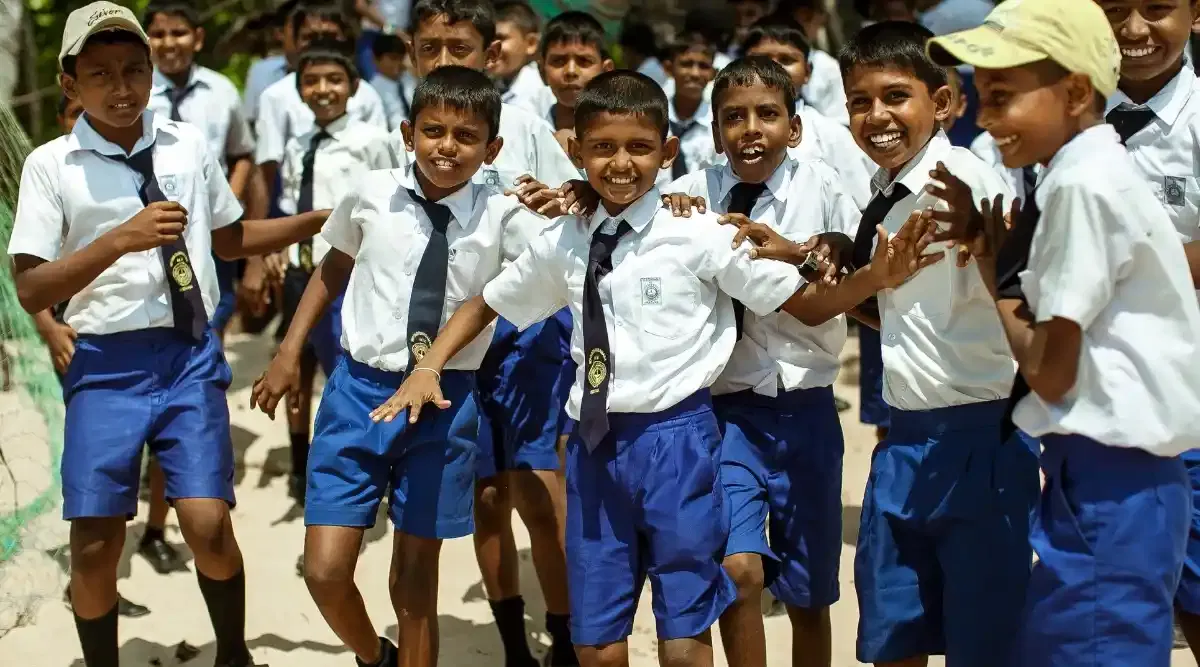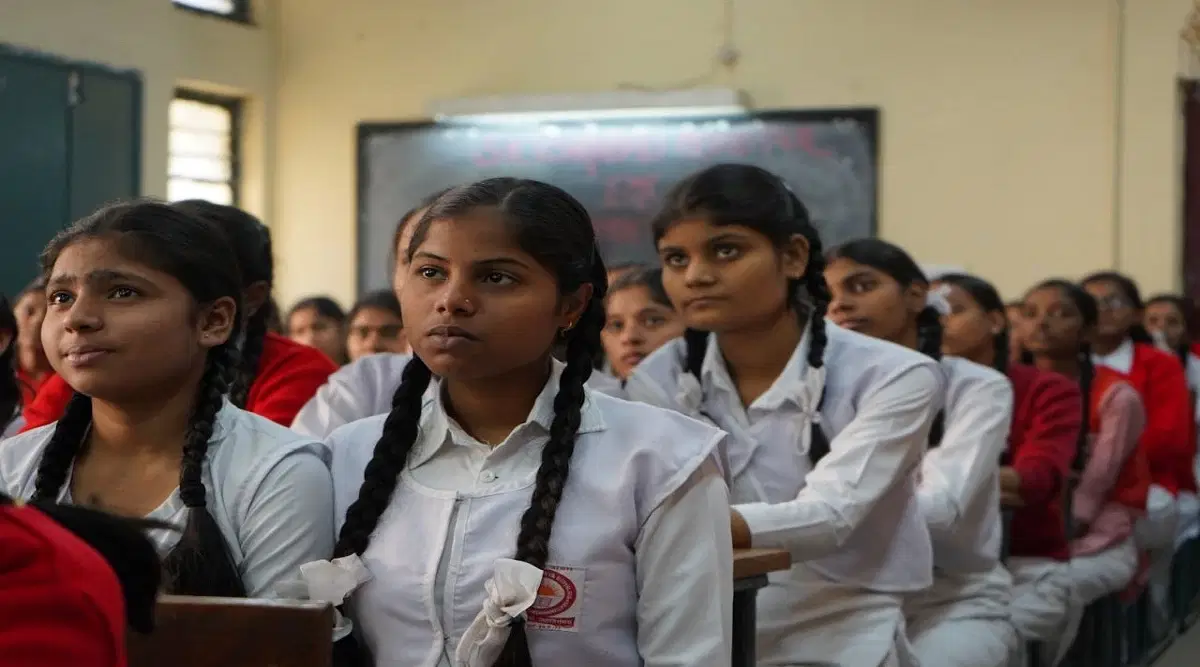RBSE Class 10 Syllabus 2025-26 Released: Download Latest and Revised RBSE Class 10th Syllabus PDF with Subject-wise
Table of Contents
The RBSE 10th syllabus 2025-26 was published by the board on the official website for Hindi, English, Mathematics, Science, and Social Studies. Students have to familiarize themselves with the updated topics as it help them to study effectively. They have to ensure that all the topics and chapters are covered thoroughly to score better marks.
The updated RBSE 10th exam 2026 syllabus will also help the students to understand the marking scheme and exam pattern. Furthermore, knowing the syllabus will help the students to create a successful study schedule.
| RBSE 10th Exam Pattern 2026 | RBSE 10th Sample Papers 2026 |
RBSE 10th Syllabus 2025-26: PDF Download
The RBSE board has published the detailed RBSE 10th syllabus 2025-26 on the official website. Students have to go through the syllabus as it includes important topics, chapters, and instructions. It includes the topic-wise weightage system which will help the students to prepare for the board exams effectively.
Furthermore, the syllabus is curated by the subject experts to help the students score better marks in the board exam. The following is the RBSE 10th 2025-26 syllabus in PDF format that candidates can refer to.
| Particulars | PDF Link |
| RBSE 10th syllabus 2025-26 | Click Here |
Read More: RBSE Class 10 Blueprint
RBSE 10th Syllabus 2025-26: Subject-Wise
The RBSE class 10th 2025-26 syllabus is an essential resource for students as it helps them plan their studies and prepare for the upcoming RBSE class 10th boards. Questions in the RBSE class 10 exam consist of MCQ, short answer type, and long answer types from all the chapters and topics in the syllabus.
Students can also refer to RBSE class 10 previous years' question papers to review the topic allocation from the syllabus. A detailed RBSE 10th 2025-26 syllabus is provided below.
RBSE 10th Syllabus for English
RBSE class 10th English syllabus is a compulsory subject and students have to score the passing marks. The detailed English syllabus is provided below for the student's reference.
Reading
- 2 unseen passages with a word count of 350 words
- Both passages will be in prose form
- One passage will be factual, whereas the other one will be discursive
Writing
Letter Writing
- Personal — To friends, relatives and family members.
- Official — To Government officials, Editors newspapers or magazines, Headmaster/Principal
- Email — To family, friends, relatives, Government officials, the editor, teachers, headmaster, principal and others.
Short Writing Tasks
- To write a short story based on a provided outline
- A short writing task based on a verbal or a visual stimulus (picture, chart, table etc.)
Grammar
The Grammar syllabus will include the following areas for teaching
- Conjunctions
- Reported Speech
- Relative Pronouns
- Active and Passive Voice
- Framing Questions and Question Tags
- Tense
Textbooks
- First Flight ( NCERT prescribed book)
- Footprints Without Feet (NCERT prescribed book)
RBSE 10th Syllabus for Hindi
The RBSE 10th syllabus 2025-26 for Hindi is the compulsory subject. Students have to check the detailed syllabus provided under the table below.
1. Unseen Passage
2. Writing Composition
- Essay Writing
- Letter Writing ( Informal Letter/Formal letter)
- Advertisement Writing
3. Grammar
- Noun
- Pronoun
- Adjective
- Unchangeable words
- Verb
- Suffix and Prefix
- Textbook-based Idioms and Proverbs
- Union of Letters and Compounds
4.Textbooks
- Text Book : Kshitij - Part 2
- Supplementary Book : Kritika
RBSE 10th Syllabus for Mathematics
Maths requires clarity of concepts and consistent practice. Students are advised to go through the topics and mark distributions in the RBSE class 10th syllabus 2025-26 for Maths given below:
1.Real Numbers
- The Fundamental Theorem of Arithmetic
- Revisiting Rational Numbers and their Decimal Expansions
- Revisiting Irrational Numbers
- Euclid’s Division Lemma
2.Polynomials
- Relationship between Zeroes and Coefficients of a Polynomial
- Geometrical Meaning of the Zeroes of a Polynomial
- Division Algorithm for Polynomials
3.Pair of Linear Equations in Two Variables
- Pair of Linear Equations in two variables
- Algebraic Method of Solving a Pair of Linear Equations
- Graphical Method of Solving a Pair of Linear Equations
- Methods of Solving a Pair of Linear Equations
- Substitution Method
- Elimination Method
- Cross-Multiplication Method
- Equations Reducible to a Pair of Linear Equations in two variables
4. Quadratic Equations
- Quadratic Equations
- Solution of Quadratic Equation by Completing the Square
- Solution of Quadratic Equation by Factorisation
- Nature of Roots
5. Arithmetic Progressions
- Arithmetic Progressions
- nth term of an AP
- Sum of First n terms of an AP
6. Triangles
- Similar Figures
- Criteria for Similarity of Triangles
- Similarity of Triangles
- Areas of Similar Triangles
- Pythagoras Theorem
7. Circles
- Tangent to a Circle
- Number of Tangents from a Point on a Circle
8. Constructions
- Construction of Tangents to a Circle
- Division of a Line Segment
9. Coordinate Geometry
- Section Formula
- Area of Triangle
- Distance Formula
10. Introduction to Trigonometry
- Trigonometric Ratios
- Trigonometric Identities
- Trigonometric Ratios of Complementary Angles
- Trigonometric Ratios of Some Specific Angles
11. Some Applications of Trigonometry
- Heights and Distances
12. Areas related to Circles
- Perimeter and Area of a Circle
- Areas of Sector and Segment of a Circle
- Areas of Combinations of Plane Figures
13. Surface Areas and Volumes
- Surface Area of a Combination of Solids
- Volume of a Combination of Solids
- Conversion of Solid from One Shape to Another
- Frustum of a Cone
14. Statistics
- Mean of Grouped Data
- Mode of Grouped Data
- Median of Grouped Data
- Graphical Representation of Cumulative Frequency Distribution
15. Probability
- Probability — A Theoretical Approach
RBSE 10th Syllabus for Science
Science is an exciting subject for students. Students can find critical topics in the RBSE class 10 2025-26 syllabus for Science and chapter-wise mark distribution below.
1. Chemical reactions and equations
- Chemical equation
- Types of Chemical Reaction
- Effects of oxidation reactions in everyday life
2. Acids, bases and salts
- Chemical properties of Acids and Bases
- Similarities in Acids and Bases
- Strength of an acid or base solution
- Salts
3. Metals and Non-Metals
- Physical and Chemical properties of Metals and Non-metals
- Metals and Non-metals Reactions
- Extraction of Metals
- Corrosion
- Prevention of Corrosion
4. Carbon and its Compounds
- Bonding in Carbon compounds-Covalent Bond
- Versatile nature of carbon
- Chemical properties of carbon compounds
- Some important Organic compounds- ethanol and ethanoic acid
- Soaps and Detergents
5. Periodic Classification of Elements
- Need for classification
- Early attempts at classification of elements
- Mendeleev’s Periodic Table
- Modern periodic table
6. Life Processes
- Nutrition
- Respiration
- Transportation
- Excretion
7. Control and Coordination
- Nervous system in animals
- Coordination in plants
- Hormones in animals
8. Reproduction in Organisms
- Self-reproducing organisms
- Modes of reproduction used by Single Organisms
- Sexual Reproduction
- Reproductive health
9. Heredity and Evolution
- Accumulation of Variation during Reproduction
- Heredity
- Evolution
- Speciation
- Evolution and classification
- Human Evolution
10. Reflection and Refraction of Light
- Reflection of light
- Spherical mirrors
- Refraction of light
11. Human Eye and the Colourful World
- The Human Eye
- Defects of vision and their correction
- Refraction of light through a prism
- Dispersion of white light by a glass prism
- Atmospheric refraction
- Scattering of light
12. Effects of Current
- Electric Current and Circuit
- Electric Potential and Potential Difference
- Circuit diagram
- Ohm’s law
- Factors on which the Resistance of a Conductor depends
- Resistance of a System of Resistors
- Heating effect of electric current
- Electric power
13. Magnetic Effects of Current
- Magnetic field and field lines
- Magnetic field due to current carrying conductor
- Force on current carrying conductor in a Magnetic field
- Electric Motor
- Electromagnetic induction
- Electric Generator
- Domestic electric circuits
14. Sources of Energy
- Good Source of energy
- Conventional sources of energy
- Alternative or non-conventional sources of energy
- Environmental consequences
15. Our Environment
- Ecosystem and its components
- Activities that affect the Environment
16. Sustainable Management of Natural Resources
- Management of our resources
- Forest and Wildlife
- Water for all
- Coal and Petroleum
- An overview of Natural resource management
RBSE 10th 2025-26 syllabus for Social Science
Students can find the section-wise division of marks and the class 10 syllabus RBSE 2025-26 for Social Science given below.
1.The Rise of Nationalism in Europe
- The French Revolution and the Idea of the Nation
- The Making of Nationalism in Europe
- The Age of Revolutions: 1830-1848
- The Making of Germany and Italy
- Visualising the Nation
- Nationalism and Imperialism
2. Nationalism in India
- The First World War, Khilafat and Non – Cooperation
- Differing Strands within the Movement
- Towards Civil Disobedience
- The Sense of Collective Belonging
3. The Making of a Global World
- The Pre-modern world
- The Nineteenth Century (1815-1914)
- The Inter-war Economy
- Rebuilding a World Economy: The Post-War Era
4. The Age of Industrialisation
- Before the Industrial Revolution
- Hand Labour and Steam Power
- Industrialization in the Colonies
- Factories Come Up
- The Peculiarities of Industrial Growth
- Market for Goods
5. Print Culture and the Modern World
- The First Printed Books
- Print Comes to Europe
- The Print Revolution and its Impact
- The Reading Mania
- The Nineteenth Century
- India and the World of Print
- Religious Reform and Public Debates
- New Forms of Publication
- Print and Censorship
6. Resources and Development
- Types of Resources
- Development of Resources
- Resource Planning in India
- Land Resources
- Land Utilisation
- Land Use Pattern in India
- Land Degradation and Conservation Measures
- Soil as a Resource
- Classification of Soils
- Soil Erosion and Soil Conservation
7. Forest and Wildlife Resources
- Biodiversity in India
- Flora and Fauna in India Vanishing Forests
- Asiatic Cheetah: Where did they go?
- The Himalayan Yew in trouble
- Conservation of forest and wildlife in India
- Project Tiger
- Types and distribution of forests and wildlife resources
- Community and Conservation
8. Water Resources
- Water Scarcity and The Need for Water Conservation and Management
- Multi-Purpose River Projects and Integrated Water Resources
- Management Rainwater Harvesting
9. Agriculture
- Types of farming
- Cropping Pattern
- Major Crops
- Technological and Institutional Reforms
- Impact of Globalization on Agriculture
10. Minerals and Energy Resources
- What is a mineral?
- Mode of occurrence of Minerals
- Ferrous and Nonferrous Minerals
- Non-Metallic Minerals
- Rock Minerals
- Conservation of Minerals
- Energy Resources Conventional and Non-Conventional
- Conservation of Energy Resources
11. Manufacturing Industries
- Importance of manufacturing
- Contribution of Industry to National Economy
- Industrial Location
- Classification of Industries
- Spatial distribution Industrial
- Pollution and environmental degradation
- Control of Environmental Degradation
12. Life lines of National Economy
- Transport–Roadways,Railways,Pipelines,Waterways,Airways
- Communication
- International Trade
- Tourism as a Trade
13. Power Sharing
- Case Studies of Belgium and Sri Lanka
- Why is power sharing desirable?
- Forms of Power Sharing
14. Federalism
- What is Federalism?
- Federal system in India
- How is Federalism practised?
- Decentralisation in India
15. Democracy and Diversity
- Case Studies of Mexico
- Differences, similarities and divisions
- Politics of social divisions
16. Caste, Religion and Gender Issues
- Gender and Politics
- Religion, Communalism and Politics
- Caste and Politics
17. Mass struggles and Movements
- Popular Struggles in Nepal and Bolivia
- Mobilisation and Organization
- Pressure Groups and Movements
18. Political Parties
- Why do we need Political Parties?
- How many Parties should we have?
- National Political Parties
- State Parties
- Challenges to Political Parties
- How can Parties be reformed?
19. Outcomes of Democracy
- How do we assess democracy’s outcomes?
- Accountable, responsive and legitimate government
- Economic growth and development
- Reduction of inequality and poverty
- Accommodation of social diversity
- Dignity and freedom of the citizens
20. Challenges to Democracy
- Thinking about challenges
- Thinking about Political Reforms
- Redefining democracy
21. Development
- What Development Promises - Different people, different goals
- Income and other goals
- National Development
- How to compare different countries or states?
- Income and other criteria
- Public Facilities
- Sustainability of development
22. Sectors of the Indian Economy
- Sectors of Economic Activities
- Comparing the three sectors Primary, Secondary and Tertiary Sectors in India
- Division of sectors as organised and unorganised
- Sectors in terms of ownership: Public and Private Sectors
23. Money and Credit
- Money as a medium of exchange
- Modern forms of money
- Loan activities of Banks
- Two different credit situations
- Terms of credit
- Formal sector credit in India
- Self Help Groups for the Poor
24. Globalisation and the Indian Economy
- Production across countries
- Interlinking production across countries
- Foreign Trade and integration of markets
- What is globalisation?
- Factors that have enabled Globalisation
- World Trade Organisation
- Impact of Globalization on India
- The Struggle for a fair Globalisation
How to Download RBSE 10th Syllabus 2025-26?
Every year, the RBSE board publishes the curriculum and syllabus for class 10 on the official website. Students can follow these steps to download the RBSE class 10th 2025-26 syllabus from the official website below:
- Step 1: Visit the official website of the Rajasthan board.
- Step 2: Click on the 'Anudeshika Pathyakram 2024-2026' link.
- Step 3: Click on the "Kaksha 10 Hetu" link.
- Step 4: The RBSE 10th syllabus will be displayed on the screen.
- Step 5: Download and save the class 10 syllabus RBSE 2025-26 PDF for future reference.
Refer to the image mentioned below to check the steps to download the RBSE class 10th syllabus 2025-26.
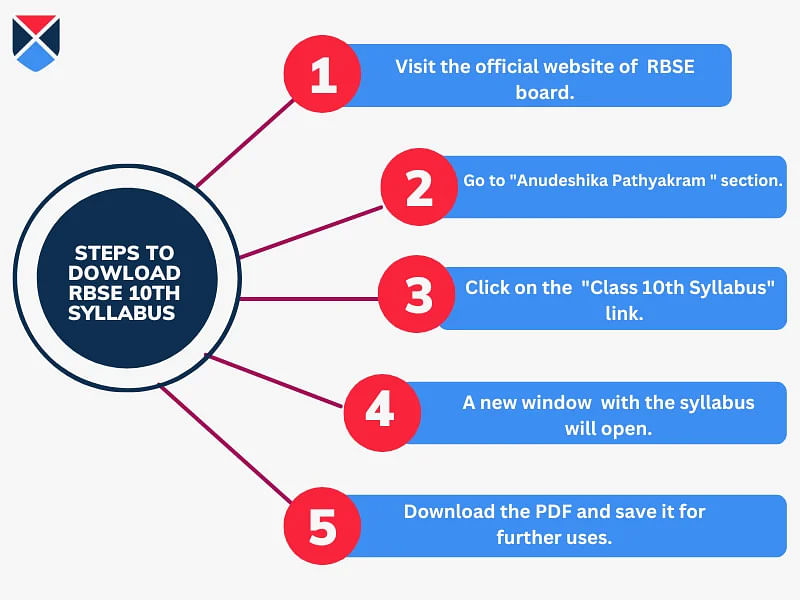
RBSE 10th Syllabus Marking Pattern 2026
The RBSE 10th syllabus 2025-26 will also include the theory and practical exam pattern for all the subjects. Students have to go through the marking scheme properly to understand the topic-wise weightage. Refer to the table below for more details.
| Subjects | Maximum Marks | Passing Marks |
| Hindi | 80 | 26 |
| English | 80 | 26 |
| Maths | 80 | 26 |
| Science | 80 | 26 |
| Social Science | 80 | 26 |
Importance of RBSE 10th Syllabus 2025-26
Candidates who wants to appear for the RBSE class 10th board exam must go through the RBSE 10th board syllabus 2025-26. The syllabus will help the students to score well in the board exam. Some of the important points are mentioned below:
- Students will understand what chapter and topic needs to study and skip while preparing for the board exam.
- The syllabus will help the students to study effectively for the board exam.
- The RBSE 10th board syllabus is provided for all the subjects including Science, Maths, Social Science, English, Hindi and Information Technology.
- All the syllabus for RBSE 10th board are curated by the subject experts and it includes all the important topics which needs to be covered in the board exam.
- Lastly, candidates can download the RBSE 10th board syllabus from the official website.
Benefits of RBSE 10th Syllabus 2025-26
Students can refer to the following important points regarding the RBSE 10th syllabus 2025-26:
- Familiarising with the RBSE 10th class syllabus 2025-26 will help candidates to become efficient and effective in their studies.
- Analyzing the syllabus for the RBSE class 10th board will give candidates a blueprint for the exam.
- Candidates are required to go through the latest RBSE 10th board examination curriculum.
- The syllabus for RBSE 10th includes some major subjects like Science, Maths, Social Science, Hindi, English, Information and technology, and Foundation of Information Technology.
- Students can also get familiar with the RBSE 10th exam pattern through the curriculum.
FAQs on RBSE 10th Syllabus
Q: From where can the students download the RBSE 10th syllabus 2025-26?
Q: Is English a compulsory subject according to the RBSE 10th 2025-26 syllabus?
Q: What are the benefits of going through the RBSE class 10th syllabus 2025-26?
Q: What is the importance of RBSE class 10 syllabus 2025-26?
Q: How long does it take to cover RBSE class 10th 2025-26 syllabus?
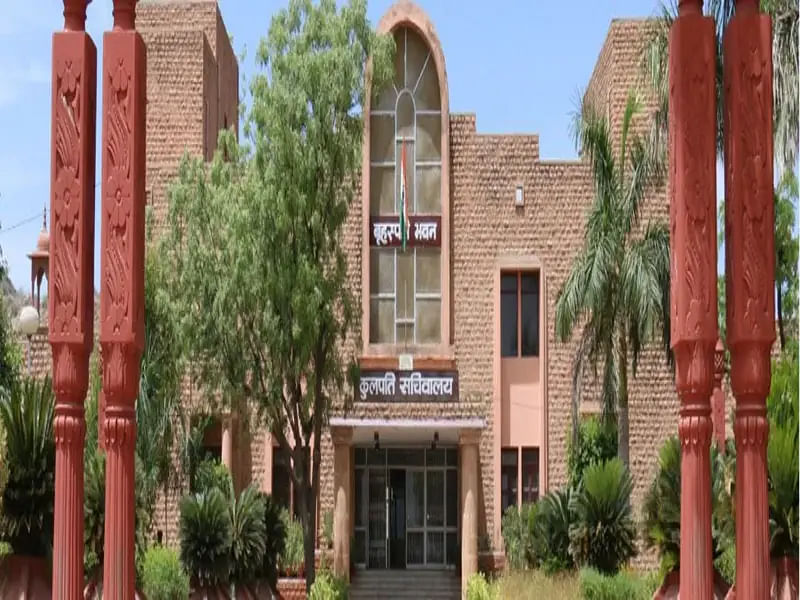
![Maharshi Dayanand Saraswati University, [MDSU] Ajmer](https://media.getmyuni.com/azure/college-image/small/maharshi-dayanand-saraswati-university-mdsu-ajmer.webp)
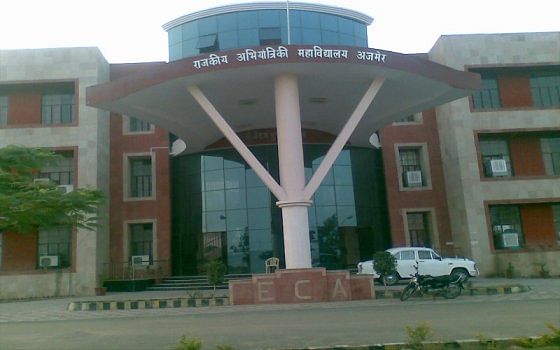

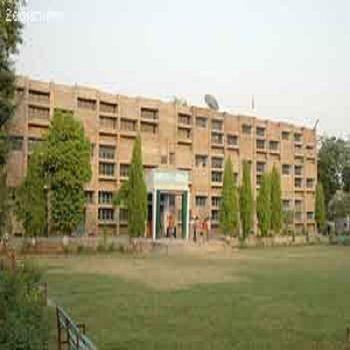

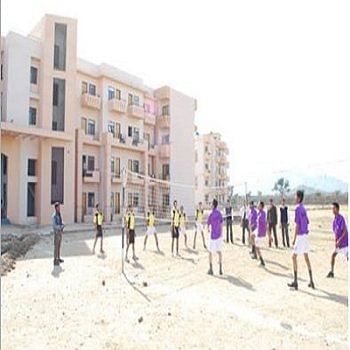
![Ajmer Institute of Technology, [AIT] Ajmer](https://media.getmyuni.com/azure/college-image/small/ajmer-institute-of-technology-ait-ajmer.jpg)
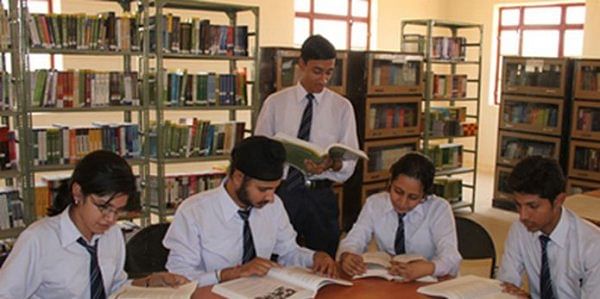
![Aryabhatta College of Engineering and Research Centre, [ACERC] Ajmer](https://media.getmyuni.com/azure/college-image/small/aryabhatta-college-of-engineering-and-research-centre-acerc-ajmer.jpg)


